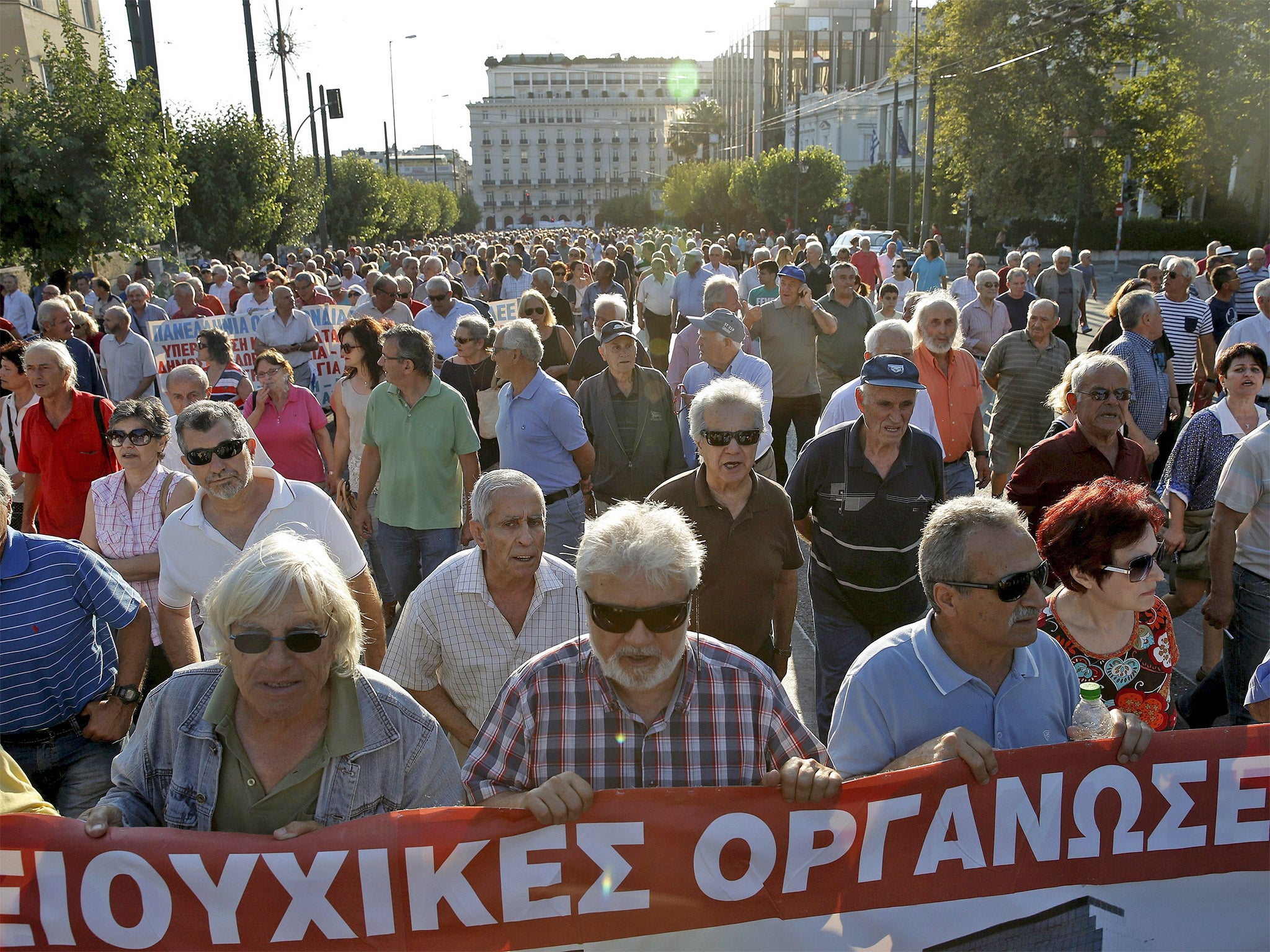Greece crisis: Greek people prepared for painful compromise amid growing talk of exit from EU
Ordinary Greeks are concerned about the effects of Tsipras's concessions

There was no jubilation on the streets of Athens on Tuesday over signs that Greece’s government was finally near to reaching a deal with its international creditors. Instead, the talk was of the concessions made, at what the rest of Europe regarded as the last minute, by Prime Minister Alexis Tsipras – and the pain they would mean for ordinary Greeks.
Five months after Syriza swept to power on the promise to end the austerity measures attached to Greece’s international bailout, its proudly strutting team of ministers had been forced, at least in part, to back down.
On Tuesday night several thousand people marched near the Greek parliament and outside the European Commission’s office – which was sealed off by police buses – in a demonstration against the imminent measure organised by a communist-backed union. They bore banners reading “They deprive us of life and dignity” and “No to health cuts, no to pension cuts.”
Earlier, a group of pensioners enjoying the relative cool of late afternoon in Syntagma square were together reading the front page of a newspaper that hung from many kiosks. “We avoided the guillotine, but the noose awaits,” read the commentary in Peloponissos, which circulates in southern Greece. The headline echoes the feelings of many Greeks who didn’t expect this Syriza-led government to succeed in forcing any significant changes.

Filipos Iliadis, 70, now receives a pension of just €400 a month, down from €700 before the crisis hit –but at least he had paid off his mortgage while working for 33 years as a typographer. “If they extend the current measures we won’t have a life,” Mr Iliadis said, though he added, philosophically: “We make ends meet with our income because we’ve learned how to survive the hard way and have always lived with little.”
His friend, Mihalis Damianidis, 75, worked as a cobbler all his life and related how the 40 per cent cuts to his own pension had left him with €599, just short of a round €600. “They even had to get their hands on that last euro,” he said, laughing.
In fact, neither man is likely to be affected by the concessions Mr Tsipras is now being forced to make: an end to early retirement, higher VAT on the tourist industry and for businesses on the Greek islands, and higher taxes for those earning more than €30,000 a year. But a short distance away Thomas, 32, an auditor at a financial services company who declined to give his surname, was in no doubt.
Wearing his sunglasses as he ate a Starbucks yoghurt he mused over the deal. “This is really bad,” he said. “I personally didn’t expect anything different with this new government and Greek people can’t expect any prospect of better days as long as they remain in the European capitalist system.”
In his view, Greece’s coalition government, comprised of left-wing Syriza and right-wing Independent Greeks, has made matters worse. It is reportedly offering the International Monetary Fund, the European Commission and the European Central Bank measures that will cut the fiscal gap by roughly €8bn – higher than had been anticipated under the previous, conservative-led administration.
Thomas is now is considering following the lead of two friends who have emigrated – one to London, the other to Amsterdam. “I think an exit from the EU is the best option for Greece, so the country can use all its natural resources,” he said. “The first six months might be difficult, but we’ll soon find our balance.”
Above him, the headline of the Journalist’s newspaper, typically left-wing and supportive of the government, was morose, reflecting the mood of many: “Painful compromise.” MPs from across the coalition government also began stating their objections to the proposed measures, raising fears of a government crisis.
One prominent Syriza MP, Eleni Sotiriou, lambasted her party’s apparent submission to the EU’s demands and threatened to vote against the measures. “The measures proposed by the government which we learn from leaks, foreign media and government briefs, cannot be ‘polished’, nor can they be supported or voted,” she told a newspaper, Path of the Left.
The Greek parliament’s deputy speaker, Alexis Mitropoulos, said the suggested measures went against the welfare of the Greek society. “I believe that in the end, this package... cannot come to the Greek parliament. My personal stance is that these measures cannot be voted for.”
The government’s junior coalition party, Independent Greeks, threatened to withdraw its support of a bailout deal if it included tax rises aimed at Greece’s island-dwelling population, which have until now enjoyed lower tax rates to boost tourism, helping the Greek economy throughout the long recession. Tourism employs one in five Greeks.

However, pro-European opposition parties suggested they would support the bailout agreement to help keep Greece in the euro, despite condemning the government’s specific proposal.
Kiriakos Mitsotakis, a former minister from the opposition New Democracy party, said Syriza had no mandate to imperil Greece’s membership of the EU. “I believe in spending cuts rather than tax hikes. But at this point any deal is better than no deal,” he told The Independent.
The result is expected to be grudging approval by a majority of Greece’s 300 MPs in a parliamentary vote over the weekend, faced with the alternative of a national default when an IMF repayment becomes due on Tuesday. But Syriza has hinted that unless a large majority of its own MPs vote for the measures, it will call fresh elections.
“A government cannot continue without the support of the MP’s that back it,” Greece’s government spokesman Gabriel Sakelaridis said. “But I don’t believe we’ll get to that point.” Only if MPs defected, he said, would the government be left with the “only choice... to resort to the polls.”
According to most analysts, however, MPs will buckle at the last minute. “Most of the angry rhetoric from coalition MPs reflects an aggressive communication strategy to show that they might resist until the last minute – but at the end it is likely they will give in,” said George Tzogopoulos, a political analyst.
Join our commenting forum
Join thought-provoking conversations, follow other Independent readers and see their replies
Comments
Bookmark popover
Removed from bookmarks